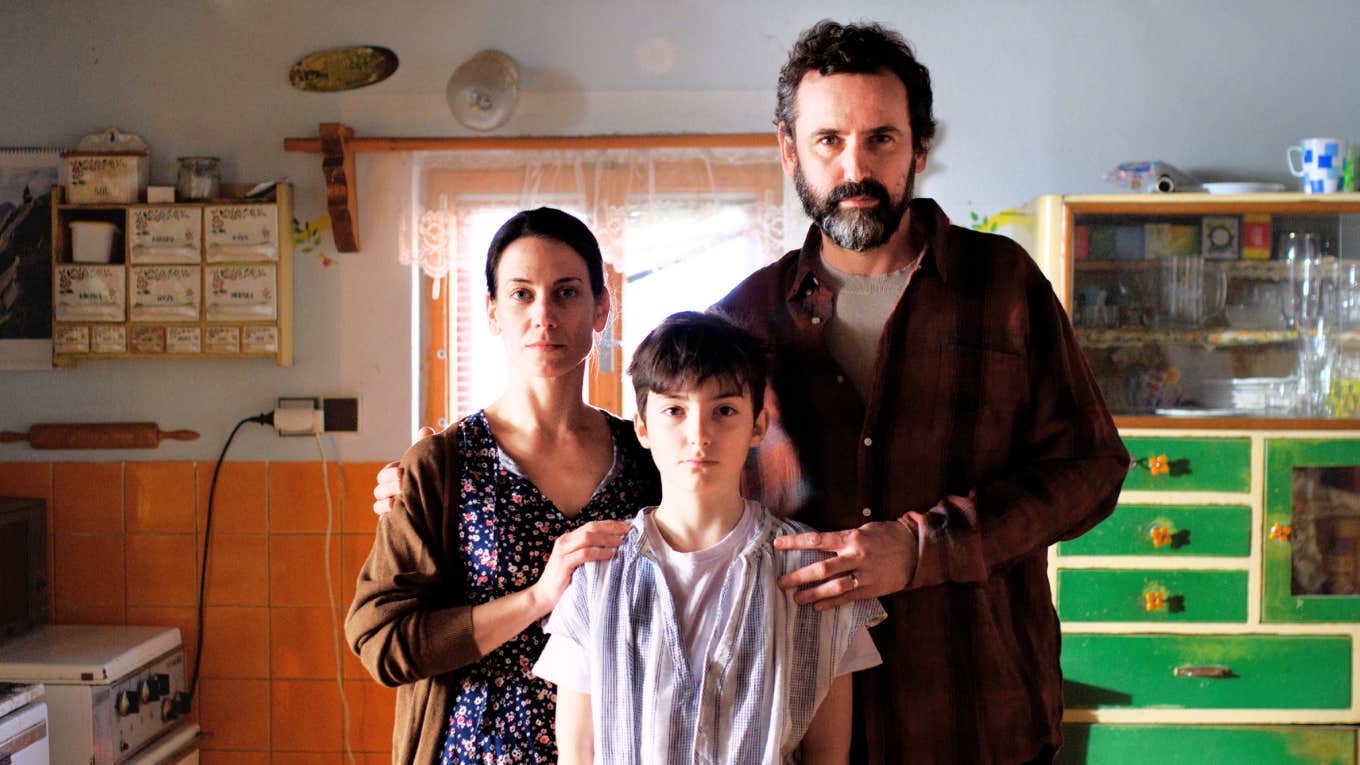The Silent Collapse Of The American Family — 'What Happens When Nuclear Families Go Nuclear?'
It’s not a nuclear family land anymore. It’s now atomic.
 halfpoint | Canva
halfpoint | Canva Editor's Note: This is a part of YourTango's Opinion section where individual authors can provide varying perspectives for wide-ranging political, social, and personal commentary on issues.
In recent weeks, it’s hard to ignore how many news headlines have started to raise awareness of the families who have split apart as a result of the new political environment we’re facing.
Families, once united, are shattering into little pieces — dissolving right in front of people’s eyes. For decades (if not centuries), the nuclear family was at the heart of American living. So, what happens when nuclear families … go nuclear?
The Silent Collapse of the American Family
 AJR_photo / Shutterstock
AJR_photo / Shutterstock
As it turns out, there is a term for the breaking apart of society from a community (or family) into lonely individuals: atomization.
Weirdly, it’s a subtle nod to the tradition of the “nuclear family,” where multiple “atoms” would create an atom’s nucleus. Multiple atoms bond to create molecules, larger bunches of the building blocks of reality.
When people atomize a substance, they break the bonds of those molecules and drop the pressure, leaving you with lonely atoms in gaseous form. If you look at how things are rolling, our society is an allegory for atomization, isn’t it?
Right now, politics has become a defining issue when it comes to the atomization of our families and society.
It’s no secret that America used to be more united. When I was a kid in the 90s, there was not much difference between Republicans and Democrats. I’d hear adults talking and they mostly agreed on major talking points.
Even in the early-to-mid 2000s, a person who denied climate change was looked at like an idiot. The same could be said of vaccines. By the 2010s, the anti-vaxxer movement took hold, and so did science denialism.
The schism keeps growing more extreme every day. I still remember that it became so breathtakingly obvious that America’s two parties no longer lived in the same reality when Trump was elected as the 45th President.
Of course, it’s not just looking at Q-Anoners that made me realize there’s no arguing with others. That stark reality difference is also palpable when you see the male backlash against feminism and incel culture.
No amount of real-life examples makes those guys realize they’re stewing in toxic, destructive garbage. And despite the obvious hate they spew, they can’t understand why women are increasingly unwilling to date anyone.
Today, there’s a growing number of people who stopped engaging with people who don’t have the same political opinions. And honestly? I’m one of those people.
Online, Trumpers are still upset that family members don’t want to deal with them after they just “disagreed on politics” which resulted in their loved ones losing basic human rights. It’s a big news story.
Politics isn't the only defining issue of our society’s atomization.
It’s o, so easy to blame politics for all the loneliness. We can sit there and talk about how the propaganda funnel took away so many people — and it did.
However, America’s atomization is a “death by a thousand cuts” type of deal. It’s not just the political scene. It’s a lot of things:
- Social media and tech isolated us. Why go out to a bar to talk to people when you could just sit at home and play video games all day? For a growing number of people, the day they finally decide to go and hang out somewhere always seems to be “later.”
- Economic issues ate our free time. It is not healthy to work two jobs just to survive. It kills our time to socialize. We’re so tired, that we can barely find time to rest before we have to punch in the clock again. Is it any wonder that a lot of us aren’t doing much socializing?
- Our society also became increasingly suspicious of everyone. Is it me, or does everyone seem to take a “guilty until proven innocent” cue these days? It used to be that striking up a conversation with a stranger was just that: a conversation. Now, people seem to think you always have an ulterior motive.
- Generally speaking, there’s been a stronger push to cut ties. A lot of people from the past only had friends (or companionship) because it was seen as uncouth to cut ties with a person in most cases. The stigma of being quick to cut ties isn’t there. It’s (often rightfully) the smart thing to do if you want to stay healthy these days.
- The stigma behind flaking on plans and even full relationships without an explanation is fading. It used to be that breakups required an in-person meetup or at least a phone call. These days, some people are ghosting partners who stuck by them for years. Even birthday parties are a gambit. When you feel like everything is a risk and that you can’t count on anyone, socializing becomes a fairly scary thing to do.
In other words, our society has been carefully crafting itself to be a world where talking and staying connected often acts like an endeavor where the juice ain’t worth the squeeze.
Even with the superficial push for “family-oriented living” by the GOP, the truth is that actual tools to make a society more community-oriented and family-friendly are just not there. Our society’s bonds broke sometime around the 2010s and it will take generations to bring them back.
The end result of an atomized society is lonely societies.
 CrizzyStudio / Shutterstock
CrizzyStudio / Shutterstock
Atomized societies are lonely societies. They are societies without much of a safety net, easy networking venues, or many opportunities to have a decent life. You can’t network your way to a better job with ease.
Atomized society means you’re always on your guard. Social anxiety becomes second nature in atomized societies because we’re so critical of one another — and so terrified of giving others the wrong impression.
Needless to say, mental health problems are pretty bad in these types of societies. And speaking of mental health, let’s talk about the other major elephant in the room: one’s ability to stand up against injustice.
Right now, we feel battered and helpless. We just keep zombie-walking into the future, one day of work at a time. It’s hard to organize days of protest because most of us are one paycheck away from hitting the streets.
If you’re like me, you’re starting to get a nagging feeling that this was done on purpose. I can’t help but notice how much the billionaire class seems to be reaping the rewards of an atomized society. Our frayed, lonely society makes it possible for them to take advantage of us all without recourse.
Considering how much scheming we’ve seen them do, is it that far-fetched to think that this current state of society would have been in the workings for decades? I think it was happening for about half a century.
Atomization was likely manufactured.
As someone who has been on the “outside” for most of their life, I can attest to the biggest issue that comes with an atomized society: the skyrocketing price of existing.
When you have a large family or large social network, you get a lot more freedom because you can pool resources. In other words, if you lose your job, you can count on others to support you.
The reason why worker strikes were so successful is because of unity. One person is easy to push around. Ten? Not so much. A hundred? That can be a lot to deal with. A thousand? Ten thousand? A million?
When you’re totally on your own, you have to pay for your housing. You don’t get the luxury of splitting costs with someone else. You don’t get the luxury of having “that guy” you know who can help you do a repair job for pennies on the market dollar.
Being on your own puts you at a massive economic disadvantage when compared to a person who has a large support network where everyone pools in together and uplifts one another.
You can’t take a day off work to organize. You can’t decline a low-paying job offer. You’re at the mercy of the dollar. If you don’t pay up, you don’t live and you starve. No one will help you.
If you take a look, there have been a lot of social movements that encouraged atomization over the years:
- “Stranger danger,” the now-debunked idea that strangers are going to be more likely to hurt your kids was huge in the 80s and 90s. While it helped marginally reduce kidnappings, the truth is the most likely person to harm a child is a loved one or someone the child knows.
- Employers have been saying it’s “impolite” to talk about money and pay with coworkers since the 1950s. Wow! What an easy way to pit coworkers against one another and also make it harder for us to realize when we’re ripped off.
- There has been a longstanding propaganda campaign against “welfare queens” as a way to justify cutting well-needed social services. This has been around long before Reagan, though he popularized it quite a bit.
- Online, the “Chad v. incel” trope it seem like some men are stealing all the women. Statistically, this isn’t true. It literally can't make sense considering how many men are coupled up or married.
- The CIA had an organization sabotage manual that encouraged people to sew seeds of discord as a method. And now, we’re seeing the most common movements suddenly crumble because of discord.
I think America was taken for a ride. The rich convinced us to literally sell our own communities out in exchange for a quick, easily spent buck. And once we had no more community to sell, it’s become the norm to be part of the all-American meatgrinder.
The greatest revolt we can do is reach out to like-minded people. Here’s the thing that we’re all ignoring: revolution always starts with one person. The people who are trying to pilfer our society are trying to make it feel like we have no options but to concede, but this isn’t true.
We need to rebuild those communities. We need to start working together by pooling resources, skills, and talent in ways that actually will benefit us all — and help us fight back against corporate fascism.
There are few things that are as disenfranchising as not having a community around you. Now is the time to empower yourself. Talk to your friends, or network. Figure out how you can help one another.
It’s the easiest and most fulfilling way to stick it to the man. I promise.
Ossiana Tepfenhart is a writer whose work has been featured in Yahoo, BRIDES, Your Daily Dish, Newtheory Magazine, and others.

